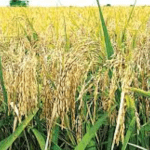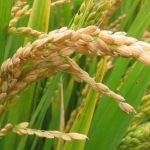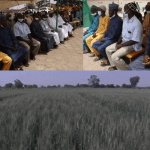Nigeria has been striving to improve the production of wheat for many years now.
Farmers in Jigawa State have keyed in to support the cause of massive yields to reduce imports.
TVC News Correspondent Ibrahim Isah reports that the wheat farmers are anticipating a bumper harvest this year.
Its the 2023–2024 wheat farming season in Jigawa State, North West Nigeria and this year, there is hope for a bumper harvest.
A wheat farmer, Mustapha Maigari inspects one of the farms in Ringim, one of the areas known for wheat production in Jigawa State.
As he does, his hopes are high considering the sudden change in weather, unlike in the past few weeks when the temperature was partially high, posing threats of shriveled and shrunken wheat kernels.
Wheat farmers are taking advantage of climate change and arable land and are producing more wheat to improve the country’s local production strength.
They converged to discuss issues relating to their development with the support of the Flour Milling Association of Nigeria, FMAN, and the Jigawa State Government.
Maigari and other wheat farmers in Ringim are now targeting 3 to 4 tones of yield per hectare this season.
Nigeria spent around N970 billion on wheat imports in 2023, according to data obtained from the National Bureau of Statistics foreign trade report.
The figures from October 2022 to September 2023 fall short of what was recorded between the fourth quarter of 2021 and the third quarter of 2022.
Both the wheat farmers in Jigawa, the Flour Milling Association of Nigeria (FMAN), and the Jigawa State Government are hopeful that Nigeria will attain self-sufficiency in wheat production and possible exportation with the strategies put in place in the near future.
Nigeria has been striving to improve the production of wheat for many years now.
Farmers in Jigawa State have keyed in to support the cause of massive yields to reduce imports.
TVC News Correspondent Ibrahim Isah reports that the wheat farmers are anticipating a bumper harvest this year.
Its the 2023–2024 wheat farming season in Jigawa State, North West Nigeria and this year, there is hope for a bumper harvest.
A wheat farmer, Mustapha Maigari inspects one of the farms in Ringim, one of the areas known for wheat production in Jigawa State.
As he does, his hopes are high considering the sudden change in weather, unlike in the past few weeks when the temperature was partially high, posing threats of shriveled and shrunken wheat kernels.
Wheat farmers are taking advantage of climate change and arable land and are producing more wheat to improve the country’s local production strength.
They converged to discuss issues relating to their development with the support of the Flour Milling Association of Nigeria, FMAN, and the Jigawa State Government.
Maigari and other wheat farmers in Ringim are now targeting 3 to 4 tones of yield per hectare this season.
Nigeria spent around N970 billion on wheat imports in 2023, according to data obtained from the National Bureau of Statistics foreign trade report.
The figures from October 2022 to September 2023 fall short of what was recorded between the fourth quarter of 2021 and the third quarter of 2022.
Both the wheat farmers in Jigawa, the Flour Milling Association of Nigeria (FMAN), and the Jigawa State Government are hopeful that Nigeria will attain self-sufficiency in wheat production and possible exportation with the strategies put in place in the near future.
Nigeria has been striving to improve the production of wheat for many years now.
Farmers in Jigawa State have keyed in to support the cause of massive yields to reduce imports.
TVC News Correspondent Ibrahim Isah reports that the wheat farmers are anticipating a bumper harvest this year.
Its the 2023–2024 wheat farming season in Jigawa State, North West Nigeria and this year, there is hope for a bumper harvest.
A wheat farmer, Mustapha Maigari inspects one of the farms in Ringim, one of the areas known for wheat production in Jigawa State.
As he does, his hopes are high considering the sudden change in weather, unlike in the past few weeks when the temperature was partially high, posing threats of shriveled and shrunken wheat kernels.
Wheat farmers are taking advantage of climate change and arable land and are producing more wheat to improve the country’s local production strength.
They converged to discuss issues relating to their development with the support of the Flour Milling Association of Nigeria, FMAN, and the Jigawa State Government.
Maigari and other wheat farmers in Ringim are now targeting 3 to 4 tones of yield per hectare this season.
Nigeria spent around N970 billion on wheat imports in 2023, according to data obtained from the National Bureau of Statistics foreign trade report.
The figures from October 2022 to September 2023 fall short of what was recorded between the fourth quarter of 2021 and the third quarter of 2022.
Both the wheat farmers in Jigawa, the Flour Milling Association of Nigeria (FMAN), and the Jigawa State Government are hopeful that Nigeria will attain self-sufficiency in wheat production and possible exportation with the strategies put in place in the near future.
Nigeria has been striving to improve the production of wheat for many years now.
Farmers in Jigawa State have keyed in to support the cause of massive yields to reduce imports.
TVC News Correspondent Ibrahim Isah reports that the wheat farmers are anticipating a bumper harvest this year.
Its the 2023–2024 wheat farming season in Jigawa State, North West Nigeria and this year, there is hope for a bumper harvest.
A wheat farmer, Mustapha Maigari inspects one of the farms in Ringim, one of the areas known for wheat production in Jigawa State.
As he does, his hopes are high considering the sudden change in weather, unlike in the past few weeks when the temperature was partially high, posing threats of shriveled and shrunken wheat kernels.
Wheat farmers are taking advantage of climate change and arable land and are producing more wheat to improve the country’s local production strength.
They converged to discuss issues relating to their development with the support of the Flour Milling Association of Nigeria, FMAN, and the Jigawa State Government.
Maigari and other wheat farmers in Ringim are now targeting 3 to 4 tones of yield per hectare this season.
Nigeria spent around N970 billion on wheat imports in 2023, according to data obtained from the National Bureau of Statistics foreign trade report.
The figures from October 2022 to September 2023 fall short of what was recorded between the fourth quarter of 2021 and the third quarter of 2022.
Both the wheat farmers in Jigawa, the Flour Milling Association of Nigeria (FMAN), and the Jigawa State Government are hopeful that Nigeria will attain self-sufficiency in wheat production and possible exportation with the strategies put in place in the near future.
Nigeria has been striving to improve the production of wheat for many years now.
Farmers in Jigawa State have keyed in to support the cause of massive yields to reduce imports.
TVC News Correspondent Ibrahim Isah reports that the wheat farmers are anticipating a bumper harvest this year.
Its the 2023–2024 wheat farming season in Jigawa State, North West Nigeria and this year, there is hope for a bumper harvest.
A wheat farmer, Mustapha Maigari inspects one of the farms in Ringim, one of the areas known for wheat production in Jigawa State.
As he does, his hopes are high considering the sudden change in weather, unlike in the past few weeks when the temperature was partially high, posing threats of shriveled and shrunken wheat kernels.
Wheat farmers are taking advantage of climate change and arable land and are producing more wheat to improve the country’s local production strength.
They converged to discuss issues relating to their development with the support of the Flour Milling Association of Nigeria, FMAN, and the Jigawa State Government.
Maigari and other wheat farmers in Ringim are now targeting 3 to 4 tones of yield per hectare this season.
Nigeria spent around N970 billion on wheat imports in 2023, according to data obtained from the National Bureau of Statistics foreign trade report.
The figures from October 2022 to September 2023 fall short of what was recorded between the fourth quarter of 2021 and the third quarter of 2022.
Both the wheat farmers in Jigawa, the Flour Milling Association of Nigeria (FMAN), and the Jigawa State Government are hopeful that Nigeria will attain self-sufficiency in wheat production and possible exportation with the strategies put in place in the near future.
Nigeria has been striving to improve the production of wheat for many years now.
Farmers in Jigawa State have keyed in to support the cause of massive yields to reduce imports.
TVC News Correspondent Ibrahim Isah reports that the wheat farmers are anticipating a bumper harvest this year.
Its the 2023–2024 wheat farming season in Jigawa State, North West Nigeria and this year, there is hope for a bumper harvest.
A wheat farmer, Mustapha Maigari inspects one of the farms in Ringim, one of the areas known for wheat production in Jigawa State.
As he does, his hopes are high considering the sudden change in weather, unlike in the past few weeks when the temperature was partially high, posing threats of shriveled and shrunken wheat kernels.
Wheat farmers are taking advantage of climate change and arable land and are producing more wheat to improve the country’s local production strength.
They converged to discuss issues relating to their development with the support of the Flour Milling Association of Nigeria, FMAN, and the Jigawa State Government.
Maigari and other wheat farmers in Ringim are now targeting 3 to 4 tones of yield per hectare this season.
Nigeria spent around N970 billion on wheat imports in 2023, according to data obtained from the National Bureau of Statistics foreign trade report.
The figures from October 2022 to September 2023 fall short of what was recorded between the fourth quarter of 2021 and the third quarter of 2022.
Both the wheat farmers in Jigawa, the Flour Milling Association of Nigeria (FMAN), and the Jigawa State Government are hopeful that Nigeria will attain self-sufficiency in wheat production and possible exportation with the strategies put in place in the near future.
Nigeria has been striving to improve the production of wheat for many years now.
Farmers in Jigawa State have keyed in to support the cause of massive yields to reduce imports.
TVC News Correspondent Ibrahim Isah reports that the wheat farmers are anticipating a bumper harvest this year.
Its the 2023–2024 wheat farming season in Jigawa State, North West Nigeria and this year, there is hope for a bumper harvest.
A wheat farmer, Mustapha Maigari inspects one of the farms in Ringim, one of the areas known for wheat production in Jigawa State.
As he does, his hopes are high considering the sudden change in weather, unlike in the past few weeks when the temperature was partially high, posing threats of shriveled and shrunken wheat kernels.
Wheat farmers are taking advantage of climate change and arable land and are producing more wheat to improve the country’s local production strength.
They converged to discuss issues relating to their development with the support of the Flour Milling Association of Nigeria, FMAN, and the Jigawa State Government.
Maigari and other wheat farmers in Ringim are now targeting 3 to 4 tones of yield per hectare this season.
Nigeria spent around N970 billion on wheat imports in 2023, according to data obtained from the National Bureau of Statistics foreign trade report.
The figures from October 2022 to September 2023 fall short of what was recorded between the fourth quarter of 2021 and the third quarter of 2022.
Both the wheat farmers in Jigawa, the Flour Milling Association of Nigeria (FMAN), and the Jigawa State Government are hopeful that Nigeria will attain self-sufficiency in wheat production and possible exportation with the strategies put in place in the near future.
Nigeria has been striving to improve the production of wheat for many years now.
Farmers in Jigawa State have keyed in to support the cause of massive yields to reduce imports.
TVC News Correspondent Ibrahim Isah reports that the wheat farmers are anticipating a bumper harvest this year.
Its the 2023–2024 wheat farming season in Jigawa State, North West Nigeria and this year, there is hope for a bumper harvest.
A wheat farmer, Mustapha Maigari inspects one of the farms in Ringim, one of the areas known for wheat production in Jigawa State.
As he does, his hopes are high considering the sudden change in weather, unlike in the past few weeks when the temperature was partially high, posing threats of shriveled and shrunken wheat kernels.
Wheat farmers are taking advantage of climate change and arable land and are producing more wheat to improve the country’s local production strength.
They converged to discuss issues relating to their development with the support of the Flour Milling Association of Nigeria, FMAN, and the Jigawa State Government.
Maigari and other wheat farmers in Ringim are now targeting 3 to 4 tones of yield per hectare this season.
Nigeria spent around N970 billion on wheat imports in 2023, according to data obtained from the National Bureau of Statistics foreign trade report.
The figures from October 2022 to September 2023 fall short of what was recorded between the fourth quarter of 2021 and the third quarter of 2022.
Both the wheat farmers in Jigawa, the Flour Milling Association of Nigeria (FMAN), and the Jigawa State Government are hopeful that Nigeria will attain self-sufficiency in wheat production and possible exportation with the strategies put in place in the near future.














